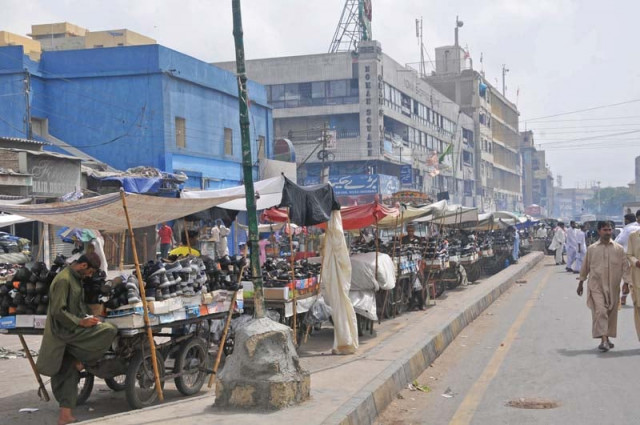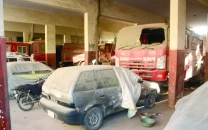Misplaced priorities: The intrusion of Karachi’s public spaces
Speakers at the seminar discuss the issue of encroachments on pedestrian walkways.

Encroachments in Saddar area of Karachi. According to Dr Syed Raza Ali Gardezi, encroachments are taking place because we have learned to live with them. PHOTO: FILE
"Pedestrians were here before these generators took their place," said Dr Syed Raza Ali Gardezi, a member of a non-governmental organisation (NGO), Shehri - Citizens for a Better Environment. He was speaking at a consultative session, 'The Issue of Encroachment in Karachi', on Saturday organised by Shehri.
The lost dream of developing Karachi’s coastline
Urban planner Farhan Anwar, also a member of Shehri, said that in the rest of the world, there was always provision for pedestrians who were given due credence. In our part of the world, however, the concept of pedestrians does not exist. For Anwar, encroachment is the gateway to a larger set of evils, such as traffic congestion, obstruction of pedestrian walkways and a disregard for right of way.
With nonfunctional parking plazas and limited public transport in the city, he questioned where the public was meant to park their vehicles. "Even if one starts parking in the parking plazas, it won't end the congestion issues," he claimed. "Do we have pavements available to walk on? Do we have pedestrianised shopping areas?" he questioned, stressing the importance of pedestrian-friendly commercial areas in the metropolis.
Anwar was of the opinion that, until we start thinking in a broader perspective, the issue of encroachments would never be solved, no matter how many parking plazas are built. He feared that soon there would be parking on flyovers and bridges.
On the billboards put up on sidewalks, he said that they were an organised invasion of pavements and walkways. Departmental stores, according to him, have started to spill out. "Over the last 10 years, commercial activities have increased, due to which areas for pedestrian movement and vehicles have been reduced," he said.
Speaking about the hilly areas of the city, which have been heavily encroached upon, Anwar said that people have lost a major recreational area by constructing homes there.
For Gardezi, encroachments are taking place because we have learned to live with them. He said that there are laws against all sort of encroachments that must be implemented by the authorities. "There are various sections of police acts which state that encroachment falls within their domain," he said, adding however that the police was always reluctant to take responsibility in this case.
Section 23 of the Police Act of 1861 says that the duties of police officers are to prevent the commission of offences and public nuisances. "Encroachment is quite a public nuisance," he pointed out, adding that Section 25 asks police officers to take charge of unclaimed property, Section 31 asks the police to keep order on public roads, whereas Section 33-A grants powers to make rules regarding the use of streets.
Karachi in 2030
District South traffic SSP Faisal Abdullah Chachar lamented that citizens pay millions in charity and for weddings and birthday parties but were not willing to pay Rs200 for motorcycles and Rs500 for cars as monthly parking charges in parking plazas. "The illegal parking mafia takes benefit from this," he pointed out.
Published in The Express Tribune, November 30th, 2015.



















COMMENTS
Comments are moderated and generally will be posted if they are on-topic and not abusive.
For more information, please see our Comments FAQ